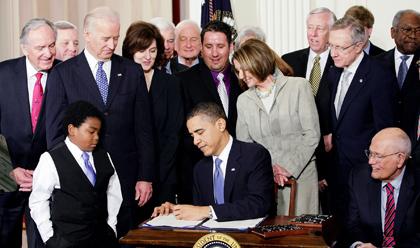By Jeremy Walsh
Queens’ struggling hospitals and small businesses will be the proving ground for the sweeping health reform legislation passed by Congress Sunday and signed into law by President Barack Obama Tuesday
The borough’s congressional representatives all voted in favor of the health care reform, which passed the U.S. House of Representatives by a 219-212 vote Sunday night. The only member of the New York City caucus to vote against the bill was U.S. Rep. Michael McMahon (D-S.I.).
In the short term, the law will eliminate the practice of denying someone coverage based on a pre-existing medical condition and end lifetime limits on health coverage as well as “recissions,” or dropping someone from a plan.
Small businesses with fewer than 50 employees will not be required to provide health coverage, but tax incentives will cover 35 percent of the cost, going up to as much as 50 percent in 2014.
In the longer term, the law will mandate that those without health insurance purchase a plan using an “exchange” that lists plans in a side-by-side comparison and penalize those who do not purchase insurance.
“It’s been easy at times to doubt our ability to do such a big thing, such a complicated thing,” Obama said before signing the bill. “You wonder if there are limits to what we as a people can still achieve. … [But] we are a nation that does what is tough, what is necessary, what is right.”
U.S. Rep. Anthony Weiner (D-Forest Hills), an outspoken proponent of health care reform, said the process of passing the law was long and arduous.
“My colleagues likened it to being pregnant for 17 months,” he said during a conference call with reporters Monday.
Weiner said the law would enable 8,000 people in his district who have pre-existing conditions to get insurance, allow 45,000 young people under 26 to continue on their parents’ health insurance and provide additional funding to help four community health centers stay open to accommodate the anticipated increase in people seeking preventative care.
“This is not the legislation I might have written,” he said, indicating he favored a public health insurance option. “But I do think it achieves many of the goals.”
U.S. Rep. Gregory Meeks (D-Jamaica) said the law would allow 54,000 uninsured people in his district to get coverage, guarantee coverage for 12,300 residents with pre-existing conditions and prevent 600 families from declaring medical bankruptcy.
U.S. Rep. Gary Ackerman (D-Bayside), whose office was picketed recently by people angry over the health care bill, said the majority of calls he received about the bill were positive. He expected members of the public most upset about the bill to calm down when the initial changes take effect.
“It’s much easier to become frightened than to become reassured,” he said. “Reassurance comes with the onset of reality. … When the boogieman doesn’t show up when the lights are out, eventually you realize it’s OK to go to sleep.”
On the municipal level, City Councilman Dan Halloran (R-Whitestone) assailed the partisan vote as “a legal fiction.”
“It’s a clear rebuke to what the American public wants,” he said. “It’s one step forward for socialism. We had a free market where innovation and competition inspired doctors to pioneer techniques.”
Albert Pennisi, president of the Queens Chamber of Commerce, said his members agreed health care reform was necessary, but he worried about how they would be affected by changes in employer-provided health insurance requirements.
“We are starting to hear that businesses with 50 or more employees may not hire more than 50 employees — they won’t expand,” he said. “We want to see how this is going to work in practice rather than theory.”
The passage of the law did not appear to alarm investors. The Dow Jones industrial average climbed by double digits on Monday and Tuesday.
Reach reporter Jeremy Walsh by e-mail at jewalsh@cnglocal.com or by phone at 718-229-0300, Ext. 154.

































